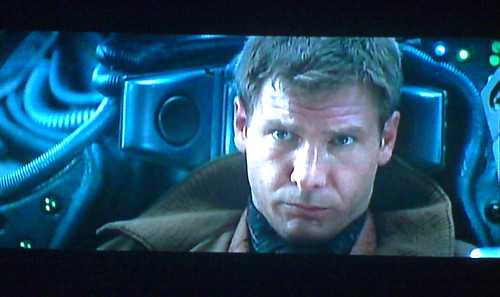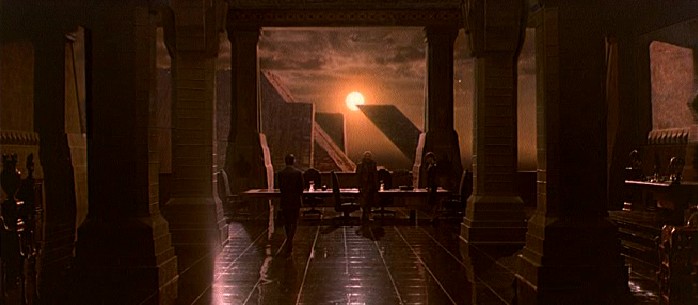
Studio: Warner Bros.,
Director: Ridley Scott,
Screenplay: Hampton Fancher, David Webb Peoples, Philip K. Dick (source),
Genre: My Most Favorite Movie Of All Time
Starring: Harrison Ford, Rutger Hauer, Sean Young, Edward James Olmos, M. Emmet Walsh, Daryl Hannah, William Sanderson, Brion James, Joe Turkel, Joanna Cassidy
I am a huge cinema fan. During my lifetime of 24 years I have watched one hell of a lot of them - action flicks, comedies, science fiction, melodramas, spaghetti westerns, horror movies, psychological thrillers, anime... And now, after all those megabytes of reviews and hours of expressed opinions, it's no coincidence that someone might ask: what is actually my personal most favorite movie? Which cinematic opus is my measuring point that I always compare other movies to, willingly or not?
This is Blade Runner.

God bless this movie.
A perfect, flawless work of cinematic art. A journey to the world of wonders and horrors of the future, a poetic confession that the same future has already arrived. As usual for Mr Scott, this future feels alive, pulsating, filled with light and color, atmosphere and perception, ethereally beautiful visual quality. Such are the diagonal skyscrapers of the Tyrell Corp. building stretched towards the sky at dusk, a close-up of the protagonist's eye, with the panorama of nocturnal Los Angeles within, a rainy, unwelcoming place filled with the flames erupting from factory pipes, the claustrophobic and busy beehive of Chinatown... It's a world of 2019, a world of replicants and their assassins - the blade runners, it's a grand futuristic panorama that is always referred to as the greatest science fiction movie ever made by everybody, including myself.

Now, isn't this beautiful?
I have to warn you, though - I won't compare this movie with its source material, the 'Do Androids Dream of the Electric Sheep' story by P.K. Dick, because Blade Runner deviates from it so far there is no real sense to compare them at all.
The main story tropes are very simple and obviously inspired by the film noir genre. Rick Deckard (coincidentally played by my most favorite actor - Harrison Ford) is a retired police officer, formerly serving as a blade runner, hunting - or as they put it, 'retiring' - the replicants, a species of android mechanisms totally indistinguishable from humans, created by the genius of Dr Eldon Tyrell. The replicants' lives are programmed to last only a couple of years, afterwards shutting down their mind and body, practically killing them. As the movie starts, the androids are declared illegal on Earth, but there is a small group that has managed to come back. Having got rid of the service shuttle guards, the synthetic rebels escape from a remote Terran colony to reach the Tyrell Corp. headquarters and demand increasing their lifespan from the creator himself. Meanwhile, Deckard is forced to follow the case by his ex-superior, who says that this matter is too mean to be assigned to anyone less skilled than the best blade runner of all. After some hesitation, Deckard agrees.

Rick Deckard - our hero.
During the investigation, he gets acquainted with beautiful Rachel (Young) and the sinister Roy Batty (Hauer). The former tries to try her best to help Deckard, so she will be able to express her humanity, but later it becomes more and more evident that she is indeed a product of Tyrell Corp., a new perfect replicant model with no aging and carefully emulated emotions.

Rachel - the futuristic femme fatale.
Roy Batty is an obsolete replicant specimen, but this fact didn't prevent him from developing genuine human feelings within. He's driven by anger at his maker that did not allow his kind to live long, but at the same time he's a curious, imaginative person. He's not an egotist that wants to have a long live himself. At some point during the movie, he actually states that he personally does not really need a long life this bad. He primarily wants to keep the lives of his friends, along with all his memories of a bright lifetime that he had outside of his home planet. Rutger Hauer is absolutely fantastic in this role, watching the puny humans at the dirty streets of rain and smog with his crystal blue eyes while delivering Nietzsche-inspired monologue.

Roy Batty - more human than human.
There's also a fair amount of secondary characters that are important for advancing the plot, including Eldon Tyrell, the replicant manufacturer, himself, but I won't focus on them to keep the spoilers to a minimum.
The world of Blade Runner is all full of symbolism, nuances and details. It's amazing how many metaphors and allusions are scattered by Ridley Scott's hand throughout every frame. Even such simple moments as characters eating, smoking, drinking whiskey, are made to look deep and conceptual, with a lot of memorable details. There are two especially breathtaking scenes I will never forget - the first meeting of Deckard and Rachel in the office building sinking in the rays of setting sun, and the famous monologue by Batty, constantly being quoted in almost every review of this movie - just read some of those and you'll understand.
This movie is actually all about memories - for example, an ingenious idea of replicants needing to keep as many photographs at their places as possible, so they won't forget the events captured on them. Also, as it turns out, the futuristic cameras are able to shoot not only what's in front of them, but also the things behind or beyond the frames - another great thought by the writers. Deckard himself keeps some heaps of photos at his apartment - could it mean..?
A lot of contemporary viewers are complaining that this movie lacks on pacing and becomes real boring at times. Well, it is definitely not an action film, it's not a futuristic version of Indiana Jones, totally not something you watch with popcorn and soda at your side. If you want to fully emerge yourself into Ridley Scott's dreamlike vision, dispose of all the external stimuli, turn all the lights off, use headphones, and when the surreal Vangelis's music will start bending your conscience - the atmospheric grip will not let you go until you'll see the end credits.

The famous Tyrell building shot.
Unfortunately, Blade Runner was not a smash hit when it first came out. It was a box office bomb, being rejected even by Siskel and Ebert. It all was caused by the primitive sugary happy ending slapped at the last moment by Scott nearly at the producers' gunpoint. There were few director's cuts since, making it a total of five versions of the movie, and the darkest of them all was once again released in theaters, for the audience and critics to give their standing ovations. That's why I personally recommend the 'Definitive' version, where the sky is clear in one of the last scenes, and Deckard is awake during the unicorn dream sequence. It is considered the ultimate cut by the creators themselves.
And now, the hardest part... The verdict.
I've seen the movie you people wouldn't believe. A turning point in the cyberpunk media, providing the vital influence to a genre yet unborn at the time. I've seen the unearthly beauty of the futuristic cityscapes glitter in the dark above Los Angeles. All those... moments will be lost in time, like tears... in rain.

No comments:
Post a Comment